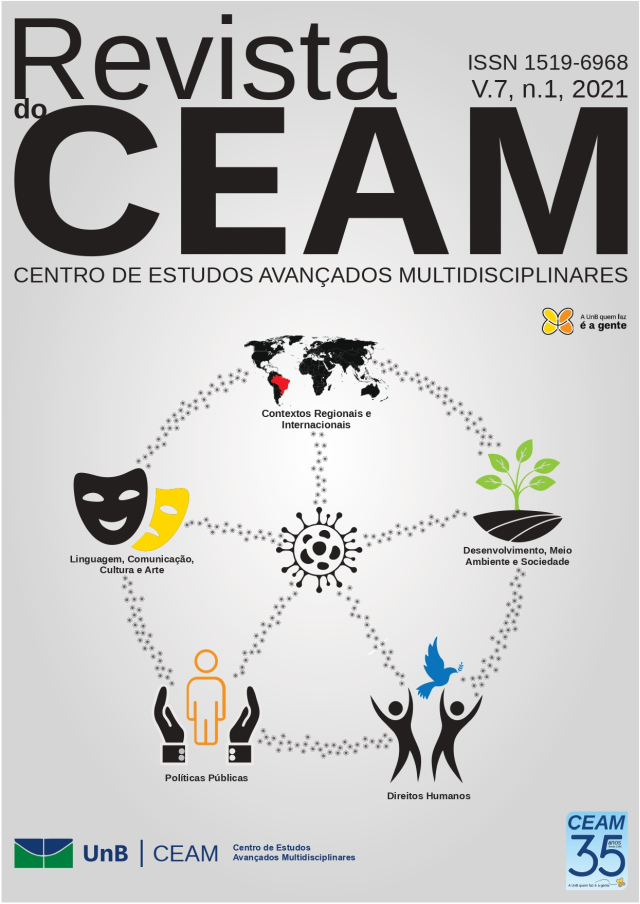Clandestine parties and measures restricting mobility during the SARS-COV-2 pandemic (COVID-19)
DOI:
https://doi.org/10.5281/zenodo.5939438Keywords:
Brazil, Brasília, Clandestine parties, COVID-19, Freedom of assembly, Freedom of movement, Human rights, Pandemics, Party, Public health, Right to culture, Right to work, Sars-Cov-2Abstract
It analyzes the phenomenon of clandestine parties during the period of social distancing measures imposed due to the Sars-Cov-2 (COVID-19) pandemic in the years 2020 and 2021, with special attention to the geographic profile of the Federal District. Based on this context, it promotes a reflection on an alleged antinomy and political positions that diametrically oppose, on the one hand, human rights to freedom of movement and assembly, to participate freely in the cultural life of the community and to work, and, on the other, to guarantee of public health and the spirit of solidarity, and on how restrictions on individual freedoms served as a basis both for fears related to biopolitics and the state of exception (manifested with more representation by Giorgio Agamben) and for the more inconsequential liberal individualism and authoritarian, especially in Brazil. Rescues the Party category from Mikhail Bakhtin and Henri Lefebvre, brings examples of parties in the most adverse historical circumstances and seeks to understand the reasons why people ignore health and life risks and relegate solidarity and mourning to a second plan to instead join in clandestine events. From a qualitative sample of news in the most accessed media in the Federal District, it raises the possibility of an excessive, sensationalist or differentiated approach to the subject in relation to other generators of agglomeration. It is wondered what would be (or would have been) the consensual scenario conducive to avoiding or minimizing the phenomenon.
Downloads
References
AGAMBEN, Giorgio. Reflexões sobre a peste: ensaios em tempos de pandemia. São Paulo: Boitempo, 2020.
__________________. ¿En qué punto estamos? La epidemia como política. Buenos Aires, Argentina: Adriana Hidalgo Editora, 2020.
ALZUETA, Esteban Rodríguez. “Las trampas de la unidad: Malvinas, el Guasón y el coronavirus: una prevención hecha de desconfianza y enemistad”. In: SVAMPA, Maristella et al. La fiebre. ASPO (Aislamiento Social Preventivo y Obligatorio), 2020.
BAKHTIN, M. M. A cultura popular na Idade Média e no Renascimento: o contexto de François Rabelais. São Paulo: Hucitec; Brasília: Editora da Universidade de Brasília, 2010.
BEEVOR, Antony. Berlim 1945: a queda. Rio de Janeiro: Best Bolso, 2015.
BROWN, Wendy. Nas ruínas do neoliberalismo: a ascensão da política antidemocrática no ocidente. São Paulo: Politeia, 2019.
ESCRIVÃO FILHO, Antonio; SOUSA JUNIOR, José Geraldo de. Para um debate teórico conceitual e político sobre os direitos humanos. Belo Horizonte: D'Plácido, 2019.
FRASER, Nancy. Justiça anormal. Revista da Faculdade de Direito da USP, v. 108, p. 739- 768, jan./dez. 2013.
GALINDO, María. “Desobediencia, por tu culpa voy a sobrevivir”. In: AGAMBEN, Giorgio et al. Sopa de Wuhan. ASPO (Aislamiento Social Preventivo y Obligatorio), 2020.
LEFEBVRE, Henri. O direito à cidade. Itapevi, SP: Nebli, 2016.
SAAD FILHO, Alfredo; MORAIS, Lecio. Brasil: neoliberalismo versus democracia. São Paulo: Boitempo, 2018.
SANTOS, Boaventura de Sousa. A cruel pedagogia do vírus. São Paulo: Boitempo, 2020.
SCHWARCZ, Lilia Moritz; STARLING, Heloisa Murgel. A bailarina da morte: a gripe espanhola no Brasil. São Paulo: Companhia das Letras, 2020.
TEIXEIRA, Marcelo Augusto de Almeida. "A cidade boêmia: circulando ideias e formando corpos". In: XII Seminário da História e Urbanismo. A circulação das ideias na construção da cidade: uma via de mão dupla, 2012, Porto Alegre. Porto Alegre: XII Seminário da História e Urbanismo, 2012.
____________________________________. “Vivendo a noite urbana, pensando a vida noturna: das cidades 24 horas a Brasília”. In: Fórum Habitar 2014, 2014, Belo Horizonte. Belo Horizonte: Anais do Habitar 2014, 2014.
ŽIŽEK, Slavoj. Pandemia: COVID-19 e a reinvenção do comunismo. São Paulo: Boitempo, 2020.
Downloads
Published
How to Cite
Issue
Section
License
Copyright (c) 2021 Willy da Cruz Moura

This work is licensed under a Creative Commons Attribution 4.0 International License.
Autores mantém os direitos autorais e concedem à Revista do CEAM o direito de primeira publicação, com o trabalho simultaneamente licenciado sob uma Licença Creative Commons - Atribuição 4.0 Internacional, permitindo o compartilhamento do trabalho com reconhecimento da autoria do trabalho e publicação inicial nesta revista.









